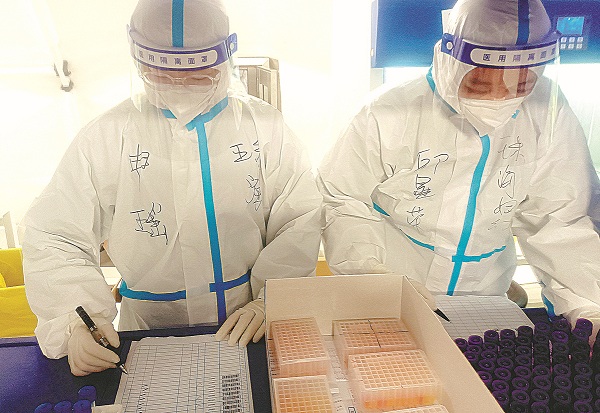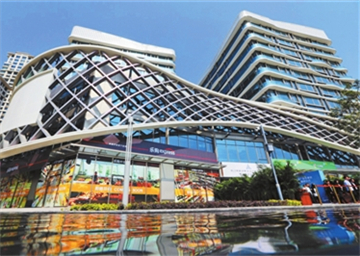Husband and wife join in fight against outbreak
Shen Yao and her husband Qiu Xianrong, lab technicians at two hospitals in Zhuhai, Guangdong province, learned on April 2 that help was needed in Shanghai in its fight against a major COVID-19 outbreak. They arrived in Shanghai the next day, leaving their two young children with their grandparents.
Both of them have since been working at an inflatable lab for nucleic acid testing in Minhang district, along with technicians from hospitals in Shanghai, other cities in Guangdong and the testing company that operates the lab.
Thirty-six-year-old Shen leads a team of 14 from Guangdong, organizing the lab work and overseeing measures to prevent the infection of team members.
The workload is much heavier than what Shen had experienced at Zhuhai branch of Guangdong Hospital of Traditional Chinese Medicine.
"I didn't expect that we could do so much," Shen said over the phone on Friday.
On each of three daily shifts, more than 100 people, in full protective gear, work at five lab units.

Shen Yao (left) and her husband Qiu Xianrong log nucleic acid test samples at a lab in Shanghai, on Monday. CHINA DAILY
The three shifts process more than 100,000 test samples a day. People change shifts every three days. The shift from 5 am to 1 pm takes up the largest share of the workload, dealing with 47,000 test tubes on Thursday for example.
"When we first came, I told my team members to get accustomed to the workflow here and integrate well with the teams that had come before us. We took great caution not to make any mistakes with the samples. The workflow has been very smooth. The Shanghai team leader also said that our workload had increased and that we were working together very well," Shen said.
Shanghai had reported more than 300,000 infected people by Thursday in the ongoing outbreak.
"We want to produce the test results as soon as possible. We want to do it quickly and accurately. If the positive test results decrease, the residents here should feel calmer and more hopeful," Shen said.
A total of 300 medical workers were sent from Guangdong province on April 3 to help with testing in Shanghai. By Thursday, they had completed testing samples from 15.6 million people.
Shen had volunteered to help with the fight against the COVID-19 outbreaks in Wuhan, Hubei province, in 2020 and in Hong Kong earlier this year but did not have to go in the end.
"I mind such matters. I feel sad when I see people having such difficulty," she said.
After she applied to help in Hong Kong, she and her colleagues had six rounds of training, including in infection prevention, and became fully prepared for such work.
Shen's 40-year-old husband Qiu, who works at Zhuhai Center for Maternal and Child Health Care, fills about five nucleic acid extracting plates an hour at the lab in Shanghai, each with spots for 90 tubes. On the day shift, he comes out of the lab once to have lunch and on the two night shifts he often sits at the work desk for about seven hours without moving. "If we come out, time and the protective gear are wasted. We have so many samples and we need to produce testing results quickly," Qiu said.
His hands often tremble after work from opening so many test tubes.
Although Shen and her husband work in the same team, they barely have time for each other. They live in separate rooms in a hotel half an hour's drive from the lab, and take food boxes to their rooms to eat under closed-loop management to prevent infection. The daily necessities supplied at the hotel are good and sufficient, she said, adding that she gets just enough time to video call her children each day.
"In Zhuhai, we also often worked long hours. The grandparents, now in their early 60s, have spent a lot of time with my kids and my daughter and son know how to take care of themselves."
Shen's daughter is a fourth grader and her son is a preschooler.
Qiu hopes that with their work, the outbreak in Shanghai and in other parts of the country will be stamped out quickly.
"I showed my kids the streets of Shanghai on the way between the hotel and the lab. They wanted to know how we work and what the city is like.
"There is a song with the lyrics that the most romantic thing is to grow old together. To us, the most romantic thing is to do nucleic acid testing in the lab together," Qiu said, jokingly.
For the moment, Qiu said, he is determined to stay in Shanghai until the outbreak is overcome.



